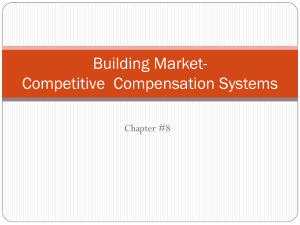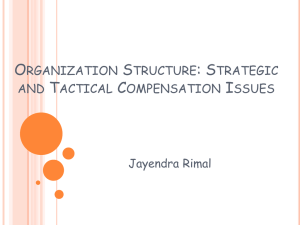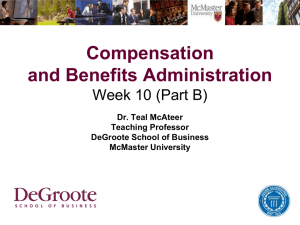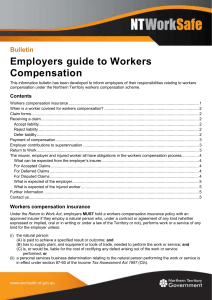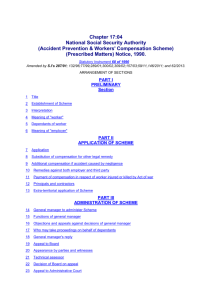Jennifer Gauger
advertisement
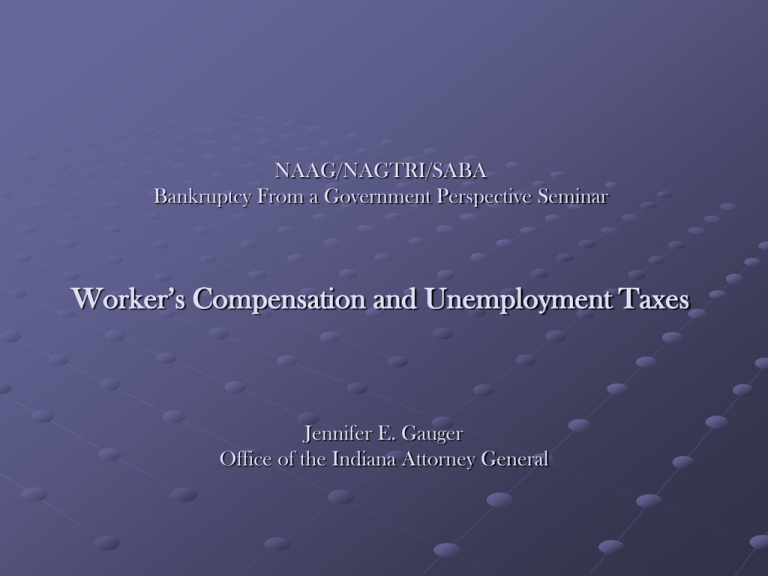
NAAG/NAGTRI/SABA Bankruptcy From a Government Perspective Seminar Worker’s Compensation and Unemployment Taxes Jennifer E. Gauger Office of the Indiana Attorney General Worker’s Compensation Overview A government-mandated insurance program designed to compensate employees who suffer job-related injuries or illnesses Every state has adopted laws to administer worker’s compensation Primary goal is to return the employee to work while providing support when the employee is unable to work Provides immediate benefits such as wage replacement and medical treatment Worker’s Compensation Overview Quid pro quo Howard Delivery Service, Inc. v. Zurich American Ins. Co., 547 U.S. 651 (2006) Common social trade-off: injured employee receives limited benefits regardless of fault while giving up right to recover full tort damages Employer-oriented thrust Policies protect employers from full tort liability and cover an employer’s obligation to pay compensation Often, if an employer is unable to pay, the employee may attain benefits from the state’s fund Foreseeable costs for worker’s compensation for employer Unemployment Insurance States usually allow employers to provide worker’s compensation in three ways: 1. Self-insurance 2. State insurance fund 3. Third-party insurance How an employer chooses to pay workers’ compensation may determine how those obligations are prioritized if the employer files for bankruptcy Worker’s Compensation in Bankruptcy All worker’s compensation claims are treated as arising on date the injury occurred, rather than the date on which the employee actually receives compensation or medical benefits Worker’s compensation obligations are pre-petition claims Receive unsecured status and may only be paid, if at all, at the end of bankruptcy Medical treatment is often withheld by health care providers who know they will only be paid as an unsecured creditor Wage replacement for the injured or ill employee may be severed Problems with the Current Approach Automatic Stay Priority (lack thereof) In re DPH Holdings Corp., 448 Fed. Appx. 134 (2nd Cir. 2012) Subject Matter Jurisdiction Injured employees are forced to litigate their rights in a potentially remote bankruptcy court Sovereign Immunity States unable to defend and litigate their own worker’s compensation laws Problems with the Current Approach Cost Shifting to the States State’s Claims for Excise Taxes Classification of Employers, e.g., non-profit entities In re DeRoche, 287 F.3d 751 (9th Cir. 2002) Discharged Upon Confirmation Different Treatment for Ordinary Wages and Health Care Benefits in Bankruptcy Unpaid wages and health care benefits accruing during bankruptcy are administrative expenses Different Treatment for Worker’s Compensation Benefits Based on the Date of Injury Case Law Updates In re Cmty. Mem'l Hosp., 494 B.R. 906 (Bankr. E.D. Mich. 2013) In re Irving Tanning Co., 2013 WL 4400254 (1st Cir. BAP Aug. 15, 2013) In re Somerset, Inc., 2013 WL 3788510 (Bankr. D. Idaho July 19, 2013) In re Wiebe, 485 B.R. 667 (Bankr. D. Kan. 2013) Proposal Treat obligations for wage replacement or medical benefit payments as becoming a “claim” under the Bankruptcy Code only when the amount is due and payable in the normal course of claims administration Consistent with the definition of “claim” in 11 U.S.C. § 101(5) Effects of Proposal Only benefits already delinquent on petition date will be treated as claims against the bankruptcy estate New benefits accruing post-petition will be treated as administrative expenses that must be paid in full for the debtor to receive plan confirmation Benefit obligations arising after confirmation will remain due and owed since they will not be “claims” until such time as the expense is incurred in the future Effects of Proposal Claims that arise during the 180-day pre-petition preference period will be given the same priority as other wage and benefit claims Except determinations relating to worker’s compensation from the automatic stay Treats employees who suffered job-related injuries or illnesses to be treated as working employees Contributions v. Reimbursements Employer contributions are considered taxes for 11 U.S.C. § 507(a)(8) priority What about reimbursements to employers who pay reimbursements in lieu of state/third-party premiums? Employer contributions meet the United States Supreme Court’s definitions of “tax” Enforced contributions - United States v. La Franca, 282 U.S. 568, 572 (1931) Pecuniary burdens” - City of New York v. Feiring, 313 U.S. 283, 285 (1941) Lorber/Suburban II test - Ohio Bureau of Workers’ Comp. v. Yoder, 36 F.3d 484 (6th Cir. 1994); County Sanitation Dist. No. 2 v. Lorber Indus. of Cal., Inc., 675 F.2d 1062 (9th Cir. 1982) Contributions v. Reimbursements Reimbursements paid by employers in lieu of contributions are not taxes In re Suburban Motor Freight, Inc., 36 F.3d 484 (6th Cir. 1994) In re Boston Reg’l Med. Ctr., Inc., 291 F.3d 111 (1st Cir. 2002) In re United Healthcare System, Inc., 396 F.3d 247 (3rd Cir. 2005) But see In re Albert Lindley Lee Memorial Hospital, 428 B.R. 283 (Bankr. N.D. N.Y. 2010) More cost shifting to the states Incentive to pay reimbursements in lieu contributions

